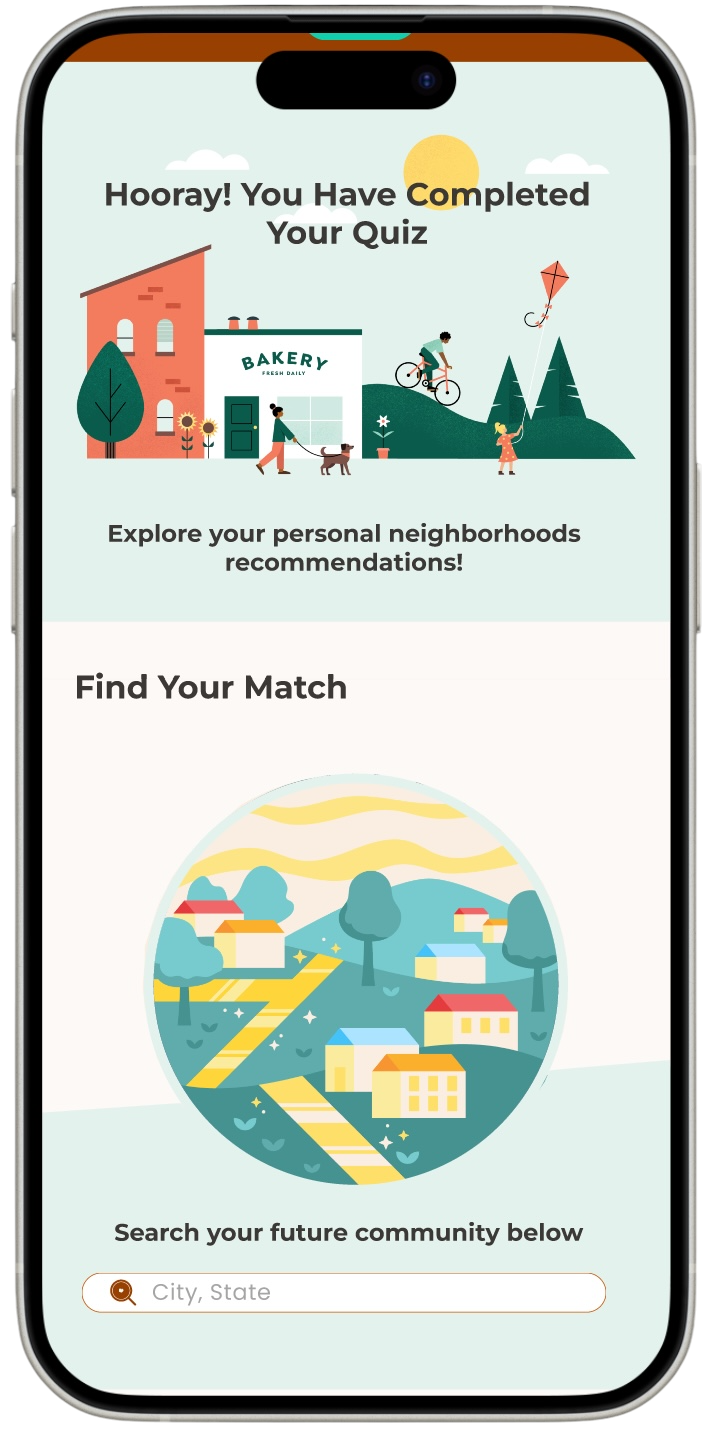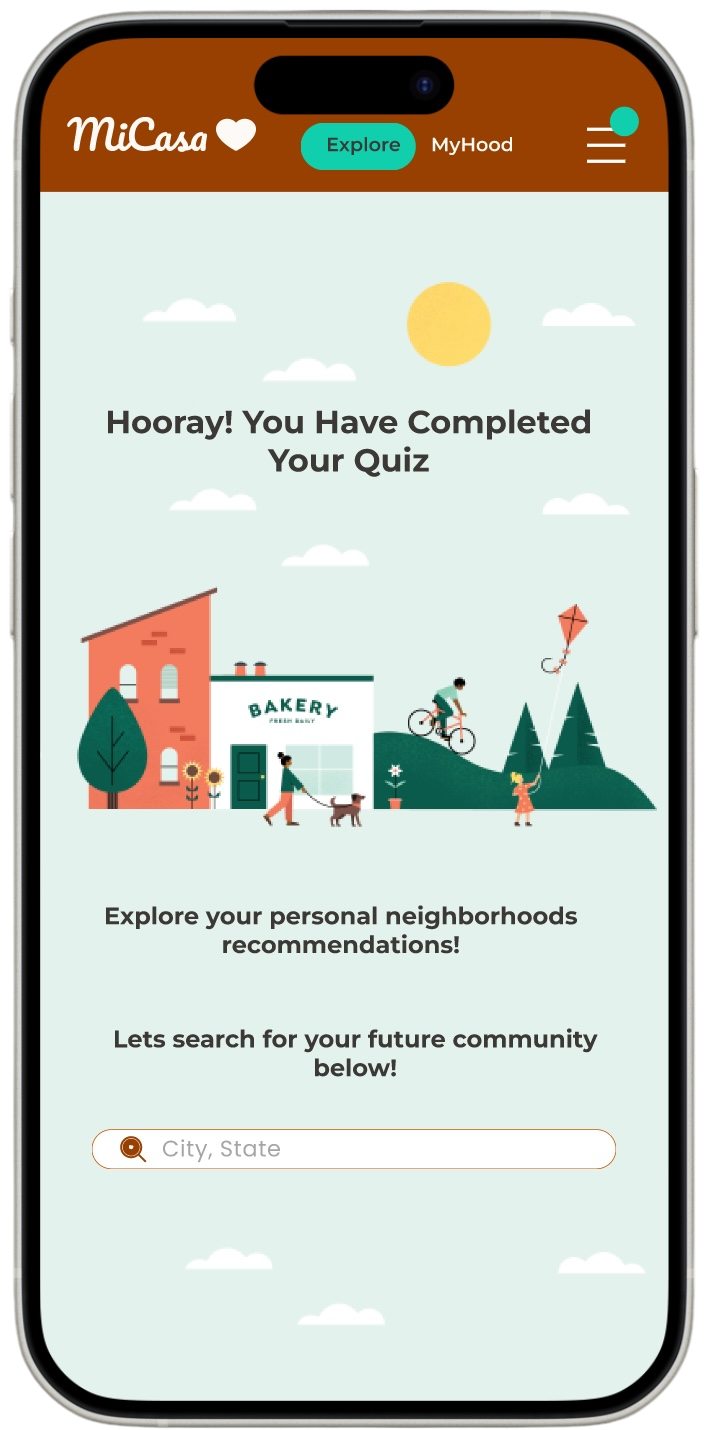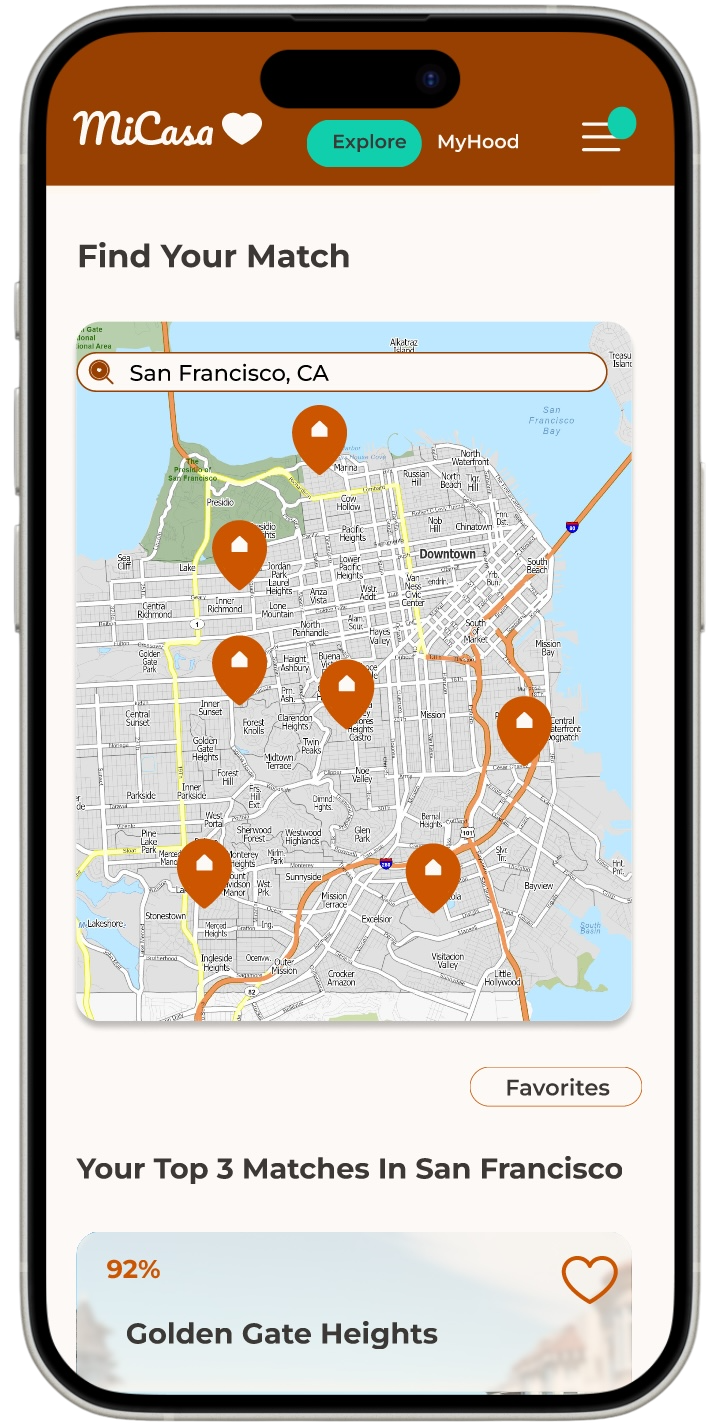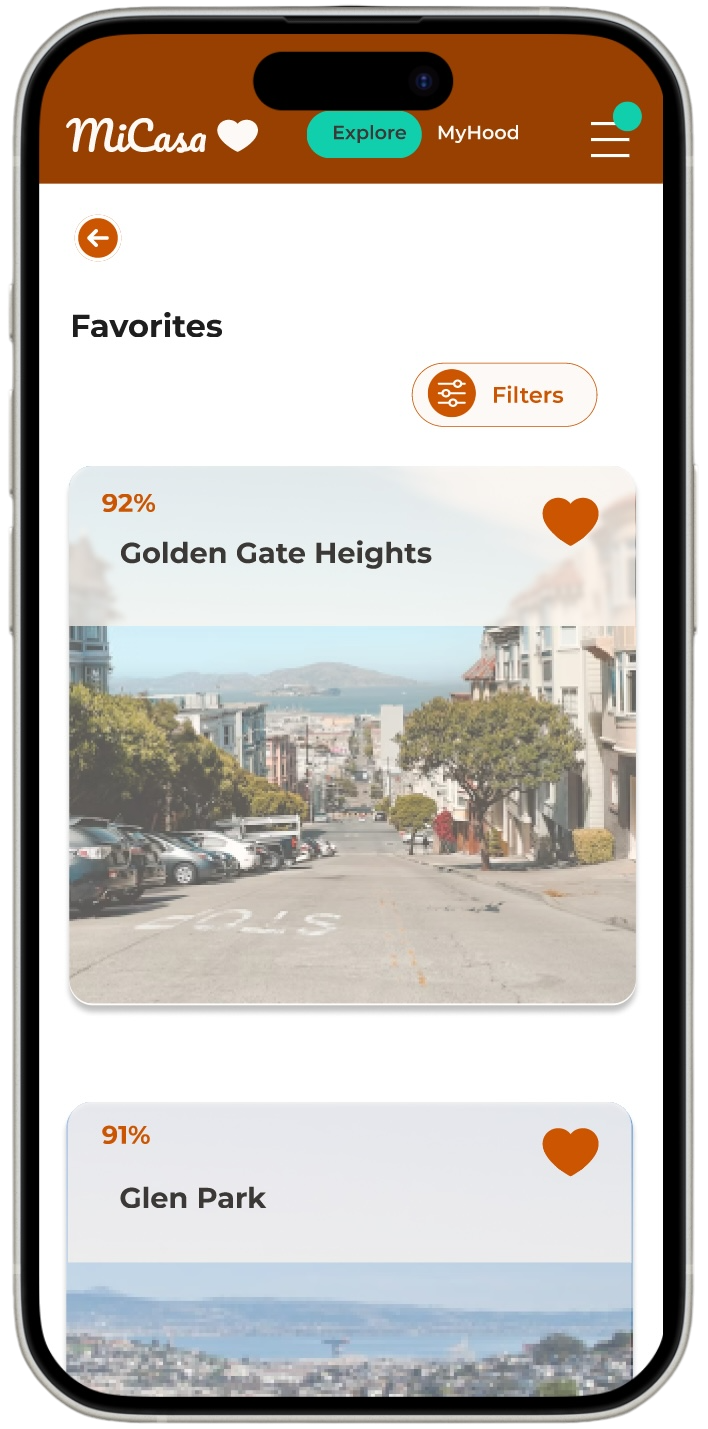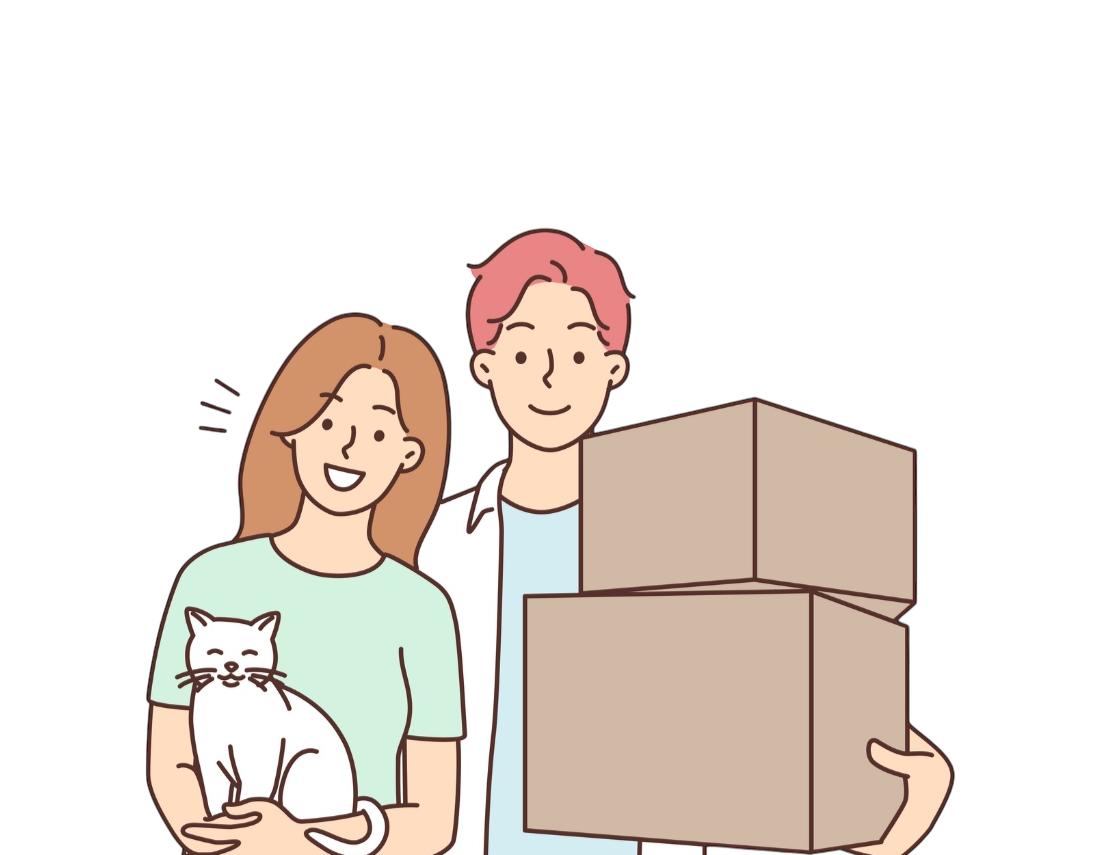miCasa
What is miCasa?
Application to help users find the perfect neighborhood when relocating to a new city
Personalizing the moving experience - MiCasa uses AI-driven recommendations based on user preferences
Address the challenges users face when moving - i.e adapting to new weather patterns and cultural environments

Background
Millions embark on journeys to new cities or states each year, facing challenges in finding essential services and adapting to new cultures. Understanding the prevalence of relocation underscores the crucial need for support and resources to facilitate newcomers' adjustment to their unfamiliar environments.
Research Goals
We want to know the primary challenges faced by newcomers when relocating to a new place so that we can develop a web/app for targeted support resources and solutions to alleviate their stressors and facilitate a smoother transition.

Objectives
1
Identify the emotional stressors experienced by newcomers during the relocation process, including feelings of anxiety, loneliness, and depression.
2
3
Explore the social isolation experienced by newcomers and the factors contributing to their difficulty in establishing social connections in their new environment.
Assess info needs of newcomers & barriers faced in accessing relevant/reliable info about essential services, local resources & community support networks.
4
Investigate the practical challenges encountered by newcomers, such as accessing healthcare services, and navigating local transportation.
5
Identify the demographics & characteristics of newcomers: age, socioeconomic status, & cultural background, to understand their needs/experiences
6
Examine the cultural adjustment process for newcomers, including language barriers unfamiliar social customs, and cultural differences impacting their integration.
7
Investigate effectiveness of existing support resources available to newcomers, identifying gaps & areas for improvement in meeting their needs
2. User Interviews
To create a user-centered app, I conducted in-depth user interviews to uncover the emotional and practical difficulties individuals face when relocating. The insights gathered from these interviews shaped the direction of the design process, ensuring that MiCasa would address real user needs.
Understanding Users’ Emotional and Practical Challenges
Findings (interviewed 7 users):
Common User Needs: Social connections, essential services, and support systems
Motivations: Personal goals, work opportunities, family well-being
Adjustment Priorities: Supportive community, cultural familiarity, accessible resources
Impact: Influenced emotional well-being and overall adjustment
Affinity Mapping
Color-coded the key insights from each interview to reveal any patterns.
Separated the patterns into 10 groupings
Key Insights
Social Isolation
Often experience lingering self-isolation despite making friends, affecting their well-being & adjustment process
Emotional Stressors
Absence of immediate family support compounded emotional stressors like depression, anxiety, & loneliness among interviewees, especially in the initial stages of relocation
Cultural AdjustmentsInvolves adapting to: lifestyle, food, & social norms, navigating diverse cultural landscapes, & adjusting to differences in pace of life and transportation systems
Moving Forward
Developing strategies to foster social connections, expand mental health support services, and provide cultural orientation programs is essential for addressing the challenges of relocation and improving the well-being of individuals moving to new areas
3. Define
Clarifying the User’s Needs and the Core Problem
User Needs: Find a neighborhood matching cultural and weather preferences
Personas & Empathy Maps: Defined primary user needs
Problem Statement: Guided the design process and feature development for MiCasa
Persona 1:
This user describes someone that moves to a new location is finding it hard to adjust to the difficult cultural dynamics of the new location
Persona 2:
This user describes someone that moves to a new location is finding it hard to adjust to the different weather climate
4. Ideate
Generating and Prioritizing Solutions for User Needs
Cardsorting
Sitemapping
5. Prototype
Bringing Ideas to Life with Wireframes and Mockups
Wireframing: Visualized app functionality with low-fidelity prototypes.
Refinement: Transitioned to high-fidelity mockups, focusing on neighborhood search and MyHood pages.
LoFi Wireframes
MidFi Wireframes
6. Testing
Validating the Design with Usability Testing
Usability Testing: Gathered user feedback to identify pain points in navigation and features.
Iterative Improvements: Refined design based on feedback, ensuring a seamless user experience.
7. Iteration
Refining the Design Based on User Feedback
Iterative Design: Refined MiCasa based on user feedback to polish the UI and enhance neighborhood matching.
Enhanced User Experience: Ensured the app meets user needs in finding the best neighborhoods.
Changes Made:
Moved the “Search” bar for Explore home page to the same screen as the “Hooray! You have completed your quiz” message. Previously, the user needed to scroll down to the next screen - this was not intuitive.
2. Enabled users to access their “Favorites” page through the hamburger menu from the top navigation bar. Previously, users were able to access it by clicking a “heart” icon on the “explore - feed page.” During the usability testing, when asked to locate their “Favorites” all the users instinctively selected the hamburger menu.
Conclusion
Comprehensive Design: MiCasa addresses core relocation challenges through a user-focused design process.
User-Centered Tool: Helps users confidently navigate moving to a new city and finding their ideal home.



































